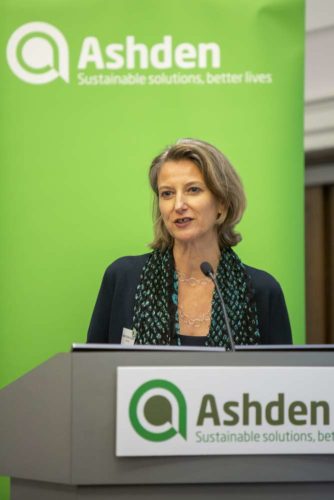Top Stories
Climate action is an equity issue
Published : 6 years ago, on
By Sarah Butler Sloss, Founder Director of the Ashden Awards
Last month, a report was published by Positive Money, which called on the Bank of England to place climate change front and centre of its mandate in order to encourage investment for low-carbon transition.
It was a strong message, reminding the central bank that it has a duty to support the push to raise private and public finance to close the green investment gap and that climate change has a direct impact on the stability of the financial system.
We should go a step further. The point needs to be made that unless finance for genuinely sustainable energy, not just in the UK, but in developing regions too, is significantly increased with immediate effect, the vital goals of the 2015 Paris Agreement and the UN’s 2030 Sustainable Development Goals will never be met.
This sounds extreme, but it is not an exaggeration to say that we face catastrophic change if we don’t take climate action seriously now. The Bank of England has the power to disincentivise continued investments in fossil fuels and encourage the re-investment of funds into sustainable energy sectors.

Sarah Butler Sloss
Globally there is a $25.6bn annual shortfall, according to a report by SE4all, in reaching the target of universal access to sustainable energy (SDG7) by 2030. Unfortunately, UK banks contribute to this by continuing to fund fossil fuel companies with billions of pounds every year, when there is growing evidence that sustainable investments are reaping rewards. The FTSE has shown, for example, that excluding fossil fuels from its index has been beneficial. Compound annual returns over the last 5 years have been 10.1% for FTSE All-World ex Fossil Fuels vs 9.5% for FTSE All-world with volatility of 10.1 vs 10.2.
A recent report in the Financial Times tells of the success of Generation, a London-based investment group for sustainable investing, that was founded by former US Vice-President Al Gore and David Blood. Generation has gathered almost $20bn in assets and notched up annualised returns in the low teens net of fees, the report says. It is being touted as one of the top performers among 400-odd long-only global equity funds of this vintage. This is exactly the kind of performance that needs to be shouted from the rooftops. Sustainable investing is about much more than reassuring corporate moral consciences.
It is not surprising that Al Gore is involved. Both he and David Blood are supporters of our own Ashden Awards, which promote and celebrate green energy initiatives. Looking back on his keynote speech at last year’s awards ceremony, he made one very apposite comment when he quoted the economist Rudi Dombusch: ‘Things take longer to happen than you think they will and then they happen much faster than you thought they could.’
I hope he’s right. Because against the backdrop of continued investments in fossil fuels, we now have to work out how we can scale up and accelerate finance for energy access, and the energy transition more generally.
The challenge, of course, is global. Where funding is available, nearly two thirds of it is going to a handful of countries. In 2014, for example, only a third of energy commitments went to 13 sub-Saharan countries, and this accounts for over half of the global population living without reliable access to electricity.
For smaller organisations the biggest obstacle to providing energy access solutions at scale is finance. It has never been easy to raise it, and it’s no easier now. Whether it’s a cookstove company in India or a PAYG company in Tanzania, the need for more patient capital, concessionary finance, as well as straightforward finance at the right size, is crucial but very hard to find. A contributory factor for this is that the energy access sector is at a fairly early development stage and lacks the distribution infrastructures that we all take for granted. It lacks end-user finance and trained human resources, so most companies in the sector have to do all of this themselves, which is tough for the bottom line.
And of course, this type of company is generally at an early growth stage, often described as the valley of death, when large amounts of growth capital are needed, and there are few organisations providing it. The sector is too nascent for the local banks to understand, so a local loan is very unlikely. The large investors and big players such as the development agencies and development banks don’t know how to deal with the smaller ticket size. It’s easier to raise over $100m+ than to raise under $2m.
To grow and scale these young innovative companies need soft, patient or concessionary capital at the right size and plenty of it.
Looking at the positives, “blended finance”, which combines donor orphilanthropic funding together with private capital, could provide liquidity for the sector. Increasingly, development finance institutions and government-backed agencies alongside family foundations, are investing their money for use in lowering the risk for commercial capital. The beauty of blended finance is that it can guarantee early losses, which makes the investment more attractive, ease the concerns of the private sector and hence leverages in significantly more capital for those businesses that need it.
Because our awards for sustainability initiatives are international and not just UK-based, we see the impact of different funding approaches at a local level. Local capital can be secured through co-signed loans between SME businesses and investors, and by doing this, local losses are also reduced. Again, the risk of first loss is guaranteed, and all parties get a seat at the table. Every year we see an increasing number of courageous energy enterprises and financial institutions trying new strategies to get finance to the energy access sector including blended capital, co-signed loans, bridge financing, corporate partnerships, loan guarantees and local currency deals.
These approaches are reaping rewards. We have calculated that, thanks to their own initiatives, the funding that enables them to operate and their sheer determination, the winners of our awards have collectively saved 13 million tonnes of CO2 a year and improved over 88 million lives over the last seventeen years.
It helps, of course, that the production costs of renewables have dropped exponentially which makes them infinitely more competitive and combined with digital technology which is enabling the user to pay for their energy in affordable instalments, decentralised energy is building momentum, placing less onus on the need for large and polluting power plants.
But what really makes a difference is that energy is being democratised so it can be accessed by those that need it most. The poorest of the poor, who have always lived without reliable power, are seeing their lives transformed because they can enter into the economy with appliances and services. Solar energy, in particular, is enabling education and economic opportunities, better health facilities, and clean, reliable and safe light for the first time, as well as the ability to charge a mobile phone without having to walk miles.
This is a crucial part of the big picture. But, to achieve global sustainable energy targets, a more supportive ecosystem of finance is needed. There is an exciting amount of talk and some very interesting work happening in this relatively new area of blended finance and other financial instruments but it needs to go further and much faster than it currently is. A change in approach and commitment is necessary from those that hold the big purse-strings. Not words, but actions. Not in the future, but now. We can’t continue to work-around or experiment, we are racing against time, and only a vast increase in finance to support energy access across all parts of the world, will stop an impending catastrophy from happening.

-
Finance3 days ago
Phantom Wallet Integrates Sui
-
Banking4 days ago
Global billionaire wealth leaps, fueled by US gains, UBS says
-
Finance3 days ago
UK firms flag over $1.4 billion in labour costs from increase in national insurance, wages
-
Banking4 days ago
Italy and African Development Bank sign $420 million co-financing deal







